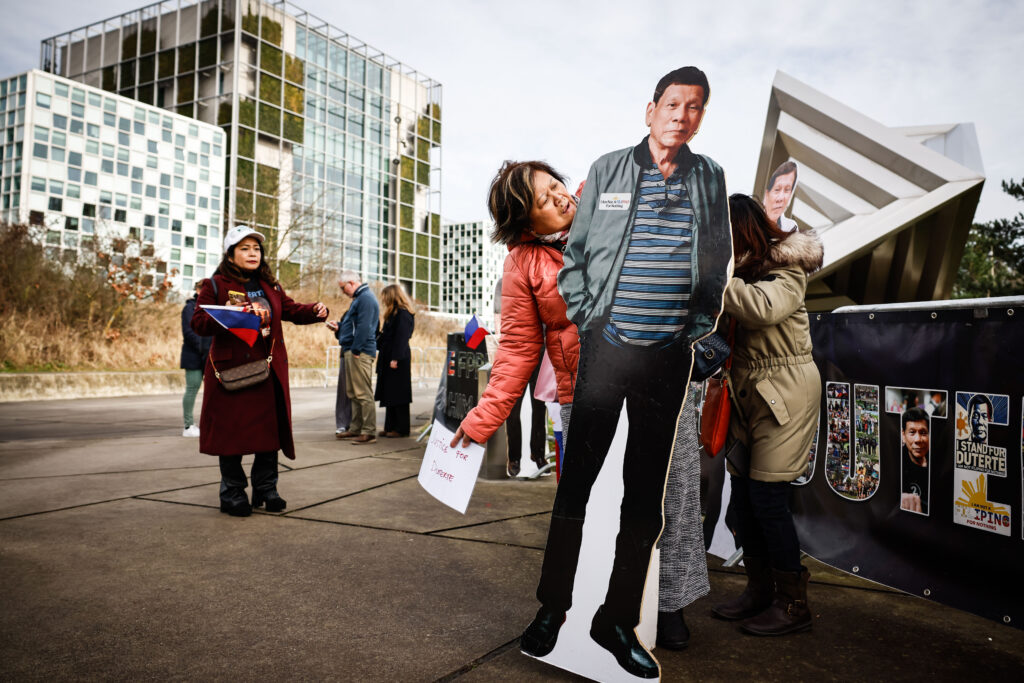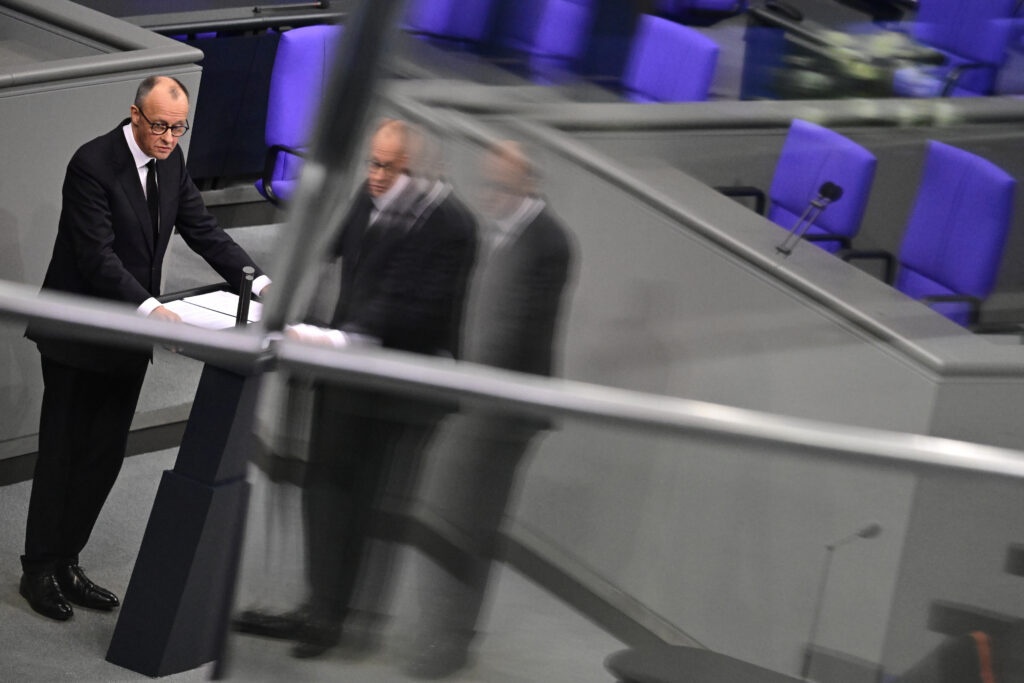A Berlin, une expo dans un bunker nazi pour encourager le soutien à l’Ukraine
Dans un ancien bunker nazi reconverti en musée, une exposition permanente consacrée à la guerre en Ukraine ouvre ses portes à Berlin mardi, quatrième anniversaire de l’invasion russe, afin de diffuser un message: il faut continuer de soutenir Kiev.Objets ramenés du front, armes et témoignages ont été récoltés pèle-même par le Berlin Story bunker, pour sensibiliser le public à “la réalité physique” de la guerre, d’après Wieland Giebel, conservateur du musée.L’espace ukrainien s’ajoute à l’exposition permanente consacrée au nazisme et à l’Allemagne de 1945 à nos jours qui est visitée plus par les touristes que par les Berlinois.”Les visiteurs en Allemagne ne peuvent pratiquement pas s’imaginer la guerre, nous voulons la montrer”, explique M. Giebel à l’AFP devant l’entrée massive du bunker construit en 1943 pour résister aux bombardements des Alliés.L’Allemagne est le premier fournisseur européen d’armes à l’Ukraine et l’un de ses principaux soutiens diplomatiques. C’est aussi le premier pays d’accueil des réfugiés ukrainiens, avec environ 1,3 million de personnes depuis le début du conflit.- Bouclier européen -Et si une majorité d’Allemands soutiennent l’Ukraine face à la Russie, les livraisons d’armes continuent de diviser une société marquée par une tradition pacifiste héritée de l’après-Seconde Guerre mondiale. Le pays connaît également un essor important d’un parti d’extrême-droite pro-russe, l’Alternative pour l’Allemagne. Après quatre ans d’une guerre dont l’issue reste inconnue, 35 % des Allemands se disent opposés à un renforcement du soutien militaire et financier à l’Ukraine.Le gouvernement du chancelier Friedrich Merz ne cesse pourtant de mettre en garde ses concitoyens: si l’Ukraine tombe, la Russie s’attaquera au reste de l’Europe. Pour cette raison, il a également lancé un vaste programme de réarmement pour faire de la Bundeswehr, la plus grande armée conventionnelle européenne.Wieland Giebel tient à ce que l’Ukraine “continue à être soutenue” par l’Allemagne et l’Union européenne, notamment grâce aux livraisons d’armes, “en particulier antiaériennes”, ajoute-t-il. Ce musée doit aider.Venue au vernissage lundi, Hanna Maliar, ancienne vice-ministre ukrainienne de la Défense, a salué “le soutien militaire, politique et culturel” de l’Allemagne, estimant en outre que “l’Ukraine est le bouclier de l’Europe”.- Epaves de drones -Dans les salles de l’exposition, poupées folkloriques côtoient une figurine du président ukrainien Volodymyr Zelensky en tenue de combat.Une vingtaine d’épaves de drones russes, ceux-là même qui s’abattent sur les soldats comme les civils, sont suspendus au plafond, au dessus d’une voiture éventrée par une bombe, acheminée dans le sous-sol du bunker depuis Kherson, ville du sud de l’Ukraine reconquise par Kiev en novembre 2022 mais qui reste, avec ses habitants, sous le feu russe.Des témoignages personnels achèvent de créer le lien avec le visiteur allemand, comme cette phrase de Roman Schwarzman, survivant de la Shoah, qui affirme: “Hitler voulait me tuer car je suis juif, Poutine veut me tuer car je suis Ukrainien”.Sur les panneaux explicatifs, la guerre en Ukraine est intégrée dans un récit construit autour de “l’impérialisme russe”, et mis en relation avec l’invasion de l’est de la Pologne par l’URSS en 1939, la répression du printemps de Prague et même l’intervention militaire russe en Syrie en 2015 pour soutenir Bachar al-Assad, le président déchu en décembre 2024.Ce musée privé s’était déjà fait remarquer lors du premier anniversaire de la guerre, en exposant devant l’ambassade de Russie à Berlin une épave de char détruit, remorqué depuis la banlieue de Kiev. Haut-lieu de mémoire avec sa quinzaine de musées et de mémoriaux consacrés à la Seconde guerre mondiale et à la Shoah, Berlin accueille depuis 2022 une multitude d’évènements mettant en avant la culture ukrainienne. Salles d’exposition et clubs de la scène alternative invitent régulièrement des artistes ukrainiens en exil.Dans ce contexte, l’ancien musée public “germano-russe”, lié à l’histoire soviétique de l’Allemagne avait retiré le drapeau russe et hissé celui de l’Ukraine, puis changé de nom pour prendre ses distances avec la Russie de Vladimir Poutine.
Au Mexique, l’Etat de Jalisco sonné par la furia vengeresse des narcos
A peine une poignée de magasins ouverts, avec des files d’attente monstres pour des achats panique. L’Etat de Jalisco sort péniblement d’un quasi-siège après les violences débridées des cartels, enragés par la mort du plus puissant baron du Mexique, qui avait fait de la région son fief.Tué par l’armée dimanche à l’âge de 59 ans, …
Au Mexique, l’Etat de Jalisco sonné par la furia vengeresse des narcos Read More »
CPI: l’ex-président philippin Duterte a personnellement dressé des “listes de personnes à abattre”
Rodrigo Duterte a personnellement dressé des “listes de personnes à abattre” et s’est vanté des meurtres commis pendant sa “guerre contre la drogue”, a déclaré mardi un procureur de la Cour pénale internationale (CPI), lors du deuxième jour d’audiences sur un éventuel procès de l’ex-président des Philippines, accusé de crimes contre l’humanité.Edward Jeremy a présenté …
AMD reçoit une commande monstre de Meta mais va devoir céder jusqu’à 10% de son capital
Le géant des réseaux sociaux Meta a conclu un accord pour l’achat de millions de puces à AMD, incluant la cession d’actions de ce dernier au propriétaire de Facebook. AMD s’est engagé à livrer, à partir du second semestre 2026, des processeurs graphiques (GPU), très prisés dans l’intelligence artificielle, représentant une puissance totale de six …
AMD reçoit une commande monstre de Meta mais va devoir céder jusqu’à 10% de son capital Read More »
France Rénov’, la nouvelle étape obligatoire pour éviter les rénovations énergétiques bancales
MaPrimeRénov’ est enfin rouverte pour tous les ménages, mais avec un rendez-vous obligatoire supplémentaire. Dans l’espace conseil France Rénov’ de Suresnes (Hauts-de-Seine), les premiers particuliers arrivent pour une heure gratuite de conseils, censée “éviter les erreurs coûteuses”, selon l’Etat.Schéma d’isolation d’un mur sur tableau velleda et dessin de VMC façon Warhol à l’appui, Baptiste Châtel explique à un couple de façon très pédagogique les différentes options pour rénover leur maison très humide et mal isolée, située à Nanterre.Loin de la simple étape administrative, le rendez-vous a des allures de cours magistral en rénovation énergétique avec explications de la notion de pont thermique, détails sur les différents matériaux isolants et rappel des règles d’urbanisme.Pour Fatija, retraitée et propriétaire occupante avec son mari Nasser de sa maison, les informations données “changent beaucoup des démarcheurs téléphoniques”, avec qui “tout va très vite”.La famille réfléchissait à rénover son logement, “où il fait froid et les murs ruissellent d’humidité”. Alors quand Fatija a appris lundi la réouverture du guichet MaPrimeRénov’, elle a “appelé tout de suite pour prendre rendez-vous”.Nouveauté 2026 du dispositif d’aides à la rénovation énergétique des logements, un rendez-vous avec un conseiller France Rénov’ est obligatoire pour tout dossier de rénovation globale (avec plusieurs types de travaux).Le but est de “garantir que les ménages s’engagent dans des rénovations de qualité, que l’argent public aille vers des travaux de qualité et donc de lutter contre les tentatives de fraudes”, explique l’Anah à l’AFP. France Rénov’ est un service public qui existe déjà depuis plusieurs années et s’est développé sur tout le territoire avec 614 espaces conseil et 2.823 conseillers.- Gratuit et neutre -Le rendez-vous obligatoire avec un conseiller de l’Etat a été expérimenté dans quelques départements, avec des retours positifs selon l’Anah. “On généralise des bonnes pratiques” pour “éviter les erreurs qui peuvent coûter cher”, explique l’agence publique. Car entre usurpation d’identité, devis gonflés, malfaçons, travaux inutiles ou risqués pour le bâti ancien, aboutir à une rénovation énergétique de qualité relève du parcours du combattant. Et ce, même avec l’aide d’un Accompagnateur Rénov’ (MAR), professionnel obligatoire depuis 2024 pour toute demande de subvention d’une rénovation d’ampleur.Beaucoup de professionnels proposent, par exemple, quasi systématiquement de changer de système de chauffage, notamment pour profiter des aides actuellement élevées pour l’installation d’une pompe à chaleur. La chaudière au gaz de Fatija et Nasser a été changée il y a une dizaine d’années. “A mon sens il n’est pas nécessaire de la changer, à moins d’un défaut, une chaudière gaz en condensation c’est déjà bien” en termes de performance énergétique, leur conseille Baptiste Châtel.Autre conseil précieux: “faire venir un professionnel pour vérifier l’état du bâtiment et traiter le problème d’humidité, il faut commencer par ça pour vérifier qu’on ne va pas aggraver les problèmes avec des travaux d’isolation”.Au final le conseiller en rénovation de l’habitat préconise d’isoler toit, murs, fenêtres et d’installer une ventilation mécanique, le tout en faisant appel à des aides MaPrimeRénov’ en parcours rénovation d’ampleur. Le choix final reviendra ensuite aux propriétaires.”N’hésitez pas à nous recontacter si besoin, je peux vous aider à la lecture des devis”, invite Baptiste Châtel. Une manière de s’assurer que le projet reste bien orienté et entre les mains de professionnels de confiance.”On est là pour offrir un service gratuit et neutre”, rappelle Tony Ferreira, directeur de l’espace conseil, qui couvre 11 communes des Hauts-de-Seine. “Les particuliers peuvent revenir, on peut être en appui tout au long du parcours”, mais “plus le ménage vient en amont, plus on peut réorienter le projet” s’il ne part pas dans la bonne direction.Les conseillers en rénovation sont aussi là pour préparer les particuliers aux délais de traitement de dossier MaPrimeRénov’ qui les attendent. L’objectif de l’Anah de 120.000 rénovations globales en 2026 est déjà amputé par les 83.000 dossiers déjà en attente, ce qui pourrait reporter à 2027 certains projets.
Briiliant Brook 100 puts England into T20 World Cup semi-finals
Captain Harry Brook scored his first T20 international century to take England into the World Cup semi-finals with a nervy two-wicket win against Pakistan in the Super Eights in Kandy.Brook, promoted to number three for the first time in a T20 international, scored exactly 100 off 51 deliveries as England chased down their target of 165 with five balls to spare, despite a late wobble.After England restricted Pakistan to 164-9, Brook came in second ball of the innings with the score 0-1 after Phil Salt’s golden duck, caught behind off Shaheen Shah Afridi.Wickets tumbled in the power play but Brook stood firm. He lifted his side from a precarious 35-3 to 155-6 when he was dismissed, having scored the second fastest century in T20 World Cup history and the first by a team captain.Brook hit four sixes and 10 fours, surpassing his previous best T20 international score of 81 not out against Pakistan in Karachi four years ago.He went to the landmark in style, powering Afridi for a six and four to complete his century off 50 balls before being bowled by the left-arm quick next ball.Brook explained that the decision for him to move up the order from five had been prompted by coach Brendon “Baz” McCullum.”Baz said that this morning, what do you think about going number three? Pakistan’s your team. I was just like, let’s do it,” said Brook.”We wanted to try and maximise the power play a little bit more and everybody knows that I like to try and take the game on and I was going to do that from ball one.”Thankfully it came off and I managed to get us a decent start.”Afridi, returning to the side, took 4-30 also removing Jos Buttler for two and Jacob Bethell for eight in the power play.Brook added 45 for the fifth wicket with Sam Curran (16) and even a burst of two wickets from Usman Tariq did not perturb the England skipper who batted with guts and resolve.Will Jacks helped his skipper towards victory with a brilliant stand of 52, scoring 28 off 23 balls.Spinner Mohammad Nawaz dismissed Jacks and Jamie Overton in the penultimate over to induce some late nerves, but Jofra Archer hit the first ball of the final over for the winning four.- ‘Outstanding’ batting -The defeat leaves Pakistan needing to beat Sri Lanka on Saturday and hope other results go their way to reach the last four after their first match in the Super Eights against New Zealand was washed out.”The way Harry Brook batted was outstanding. He completely took the game away from us,” said Pakistan captain Salman Ali Agha.”We just have to wait and see how the other results go. We’ll be hoping they go our way, and then we know we’ll have to win against Sri Lanka.”New Zealand face Sri Lanka on Wednesday in Colombo.Spinner Liam Dawson took 3-24 earlier and was ably supported by Overton (2-26) and Archer (2-32) to restrict Pakistan to 164-9.Opener Sahibzada Farhan continued his good form with a 45-ball 63, with two sixes and seven fours, his third half-century of the tournament.Archer dismissed Saim Ayub for seven in the third over while Dawson picked up Salman Agha for five in the next.Farhan and Babar Azam added 46 for the third wicket.Farhan completed his fifty off 37 balls before Overton trapped him lbw.
Germany’s Merz heads to China for talks centred on trade
German Chancellor Friedrich Merz left Tuesday for his inaugural visit to China, long a huge market for German goods but now a high-tech rival as Europe’s biggest economy struggles.Berlin and Beijing want to build on their decades-old economic ties at a time US President Donald Trump has sparked global chaos with his tariffs blitz and other erratic foreign policy moves.But Merz is also expected to stress German and European interests in his talks Wednesday with President Xi Jinping, including by urging him to put pressure on its ally Russia to end the war in Ukraine.Germany considers China, the world’s number two economy, as a key trade and investment partner — but also regards the communist one-party state as a systemic rival to the West.Many commentators have taken note of the fact that Merz first travelled to India, the world’s largest democracy, weeks before he headed to China.Merz said Friday he was going to Beijing, with a large business delegation in tow, in part because export-dependent Germany needs “economic relations all over the world”.”But we should be under no illusions,” he added, pointing out that China as a rival to the United States now “claims the right to define a new multilateral order according to its own rules”.China under Xi has grown far more assertive on the world stage, built up its military, stressed its claim on Taiwan, and pushed back strongly against criticism of its human rights record.Flexing its muscle at times of tension, Beijing has restricted exports of critical minerals used in products from microchips and wind turbines to electric car batteries and weapons systems.Last year, Beijing temporarily halted the export of Nexperia chips to Europe following a dispute with the Dutch government.More broadly, European businesses complain that China, with its low domestic demand, is flooding Europe with goods made cheap through state subsidies and an undervalued currency.Germany’s trade deficit with China hit a record 89 billion euros ($105 billion) last year.”China has risen to the ranks of the major powers,” Merz said just before leaving Berlin Tuesday, stressing that “we want a partnership with China that is balanced, reliable, regulated and fair”.- ‘Systemic competition’ -As Trump has unsettled allies and rivals alike, China has nonetheless also sought to present itself as a reliable partner and defender of the multilateral order.China’s top diplomat Wang Yi told Merz at the Munich Security Conference this month that Beijing hoped to bring ties “to a new level” and wanted Germany to be a “stabilising anchor for strategic relations” in the European Union.As other nations also seek to rebalance their economic relations, the leaders of France, Britain and Canada all recently visited China, where Trump is expected from March 31.Merz, like his predecessors Angela Merkel and Olaf Scholz, will be joined by business leaders including executives of auto giants Volkswagen, BMW and Mercedes.In Beijing, Merz will first meet Prime Minister Li Qiang, then have talks and dinner with Xi.On Thursday, Merz is to visit Beijing’s Forbidden City, then a Mercedes plant where autonomously driving vehicles will be presented. The chancellor then travels to Hangzhou, often called China’s “Silicon Valley,” to visit the robotics group Unitree and German turbine maker Siemens Energy. German businesses have given Merz a to-do list on his trip.”We expect the chancellor to clearly address problems such as overcapacity, distortions of competition, and export controls on critical raw materials,” said Wolfgang Niedermark of the Federation of German Industries.German and European companies in China are not only “competing with highly innovative Chinese firms” but are also players in a “state-driven systemic competition”.Merz should advocate for “structural reforms to strengthen domestic demand and fairer competitive conditions” in China, he said, warning that without change there will be “new trade conflicts with the EU”.







